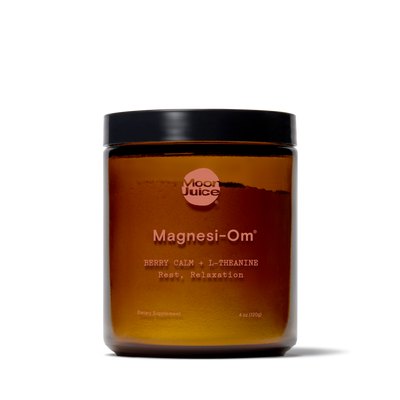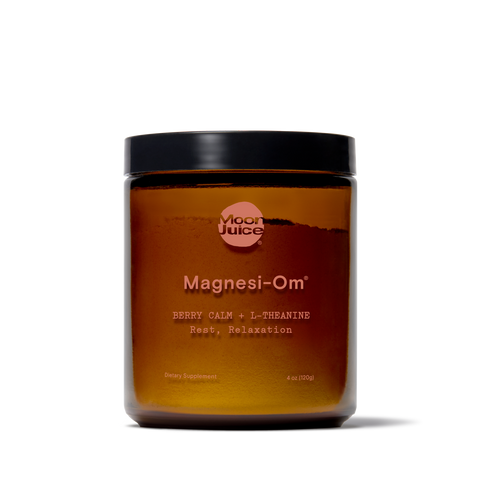Your body needs more than just water to function optimally. Electrolytes like Magnesium play an essential role in regulating bodily functions like nervous system activity, muscle contractions, and cellular fluid balance.
But more than half of U.S. adults don’t get enough of this vital mineral. Without adequate Magnesium, you might struggle to get quality sleep or maintain cognitive function.
If you want to raise your Magnesium levels, you may wonder how different Magnesium types compare — like Magnesium Bisglycinate vs Glycinate.
First off, there’s no real difference between Magnesium Glycinate and Bisglycinate. Below, we explain where the misconception comes from and outline the different health benefits of this unique form of supplemental Magnesium.
Are Magnesium Bisglycinate and Glycinate the Same?
Magnesium Glycinate and Magnesium Bisglycinate are the same chemical compounds with different names.
Magnesium Bisglycinate is the scientifically accurate name for the supplement, while Magnesium Glycinate is the name supplement manufacturers often use on consumer-facing labels.
Magnesium Bisglycinate Benefits
Magnesium Bisglycinate is a dietary supplement containing the essential mineral Magnesium and two glycine molecules. It is alternatively known as Magnesium Glycinate and Magnesium Diglycinate.
Not much research has been done on supplemental Magnesium Bisglycinate, but it may provide the following health benefits:
Help With Muscle Cramps
A small, older 2012 study analyzed 18 pregnant people experiencing leg cramps. Researchers found that taking Magnesium Bisglycinate supplements daily for 4 weeks reduced the frequency and intensity of their cramps.
86% percent of participants experienced at least a 50% decrease in the frequency of cramps when increasing their Magnesium intake, with almost 70% having a 50% decrease in cramp intensity.
Interestingly, this benefit applies to using Magnesium for PMS, particularly in reducing menstrual cramps. It can be helpful in easing cramping, providing relief from discomfort commonly associated with menstruation.
Enhances Muscle Recovery
A 2021 in-vitro study of skeletal muscle cells discovered Magnesium Bisglycinate, in combination with Vitamin D, Curcumin, and Potassium Citrate, counteracted the impact of strenuous or vigorous muscle activity.
Researchers also found the four compounds could restore muscle function after strenuous exercise.
High Bioavailability
Magnesium Bisglycinate is a highly bioavailable Magnesium compound. Bioavailability measures how much of a substance your body can absorb and use.
Dietary supplements containing highly bioavailable ingredients are more effective, as your body can absorb nutrients without needing higher doses.
May Improve Sleep
Ever considered taking Magnesium before bed? Turns out Magnesium may help you sleep better. In a 2012 double-blind, randomized clinical trial involving 46 older adults with insomnia, researchers revealed Magnesium Glycinate may improve sleep efficiency, sleep time, and sleep onset and prevent early morning awakening.
In addition, researchers found improvement in participants’ Melatonin and Cortisol levels.
Promotes Bone Health
A 2021 review of 28 studies found that magnesium glycinate may improve bone health by increasing bone mineral density and reducing the risk of bone fractures.
Helps Maintain Regular Heart Rhythm
According to a 2016 review, Magnesium Glycinate supplementation may help prevent or treat arrhythmia (abnormal heartbeat) by regulating heart rhythm. The supplement works by restricting the amount of Calcium that enters the heart cells, slowing the heartbeat.
May Improve Athletic Performance
Supplemental Magnesium Glycinate could also contribute to better athletic performance.
Authors of a 2017 review of studies conclude that Magnesium supplements may enhance muscle performance, including grip strength, lower-leg power, anklet extension strength, and jumping performance.
Understanding the Type of Magnesium Supplement You’re Getting
In addition to Magnesium Glycinate and Bisglycinate, there are many different Magnesium compounds that offer additional unique benefits:
- Magnesium Oxide: This form of Magnesium is often used as an antacid to relieve heartburn and indigestion or as a quick-relief laxative. When comparing Magnesium Oxide vs Glycinate, it has a lower bioavailability, which means you may need to increase your Magnesium intake for results.
- Magnesium Lactate: A magnesium salt made of natural lactic acid that, combined with calcium lactate monohydrate, may improve athletic performance. It’s also commonly used in dietary supplements and may be easier to digest than other forms of Magnesium.
- Magnesium Citrate: A supplement containing Magnesium Salt and Citric Acid. Magnesium citrate has a higher bioavailability and greater ability to promote regularity.
- Magnesium Gluconate: This is another highly bioavailable Magnesium form. It’s unlikely to cause digestive upset and can help increase levels in people showing signs of a Magnesium deficiency. There’s also evidence it may lower the risk of pregnancy-induced hypertension.
- Magnesium Malate: This mineral supplement contains Magnesium and Malic Acid. It can increase magnesium levels thanks to its high bioavailability. It’s another form of Magnesium that’s unlikely to cause GI symptoms.
- Magnesium Sulfate: A magnesium supplement that’s a combination of Magnesium Salt and Sulfate. It’s also known as Epsom salt. There’s limited evidence to support the benefits of transdermal absorption of this Magnesium form or that you can even absorb enough Magnesium by soaking in an Epsom salt bath. However, a salt soak in a warm bath may help relieve tension and stress.

Here are some tips for picking the right magnesium supplementation for your needs.
- Supplement type and daily dose: Choose a supplement you’re comfortable taking daily. Consider a Magnesium powder supplement that you can easily mix with water.
- Bioavailability: If you want to avoid taking a high dose, choose a Magnesium supplement with high bioavailability, like Magnesium Citrate and Magnesium Glycinate.
- Proper dosage: High doses of magnesium supplements can cause digestive upset. It may help to opt for a Magnesium powder supplement that allows you to easily adjust your dosage.
Magnesi-Om® is a Magnesium powder supplement with 3 bioavailable forms of Magnesium, including Magnesium Gluconate, Magnesium Acetyl Taurinate, and Magnesium Citrate, and L-Theanine to help regulate cellular fluid balance and promote relaxation, sleep, cognitive health, and regularity. 1 serving contains 310 milligrams (mg) of our Magnesium Chelate blend and 112 mg of L-Theanine.
Each stick or refill pouch is made with 100% backyard compostable material.
Another Magnesium supplement to consider is Sleepy Magnesi-Om, which is a Magnesium and melatonin supplement containing a sleep-promoting blend of Magnesium Bisglycinate and Gluconate, plant-based Melatonin, and L-theanine. Take it before bed to encourage calm, get to sleep faster, and enhance sleep quality. Shop now today for better sleep!Sources
- National Institutes of Health. Magnesium. https://ods.od.nih.gov/factsheets/Magnesium-HealthProfessional/
- National Library of Medicine. Timeline (Bioavailability) of Magnesium Compounds in Hours: Which Magnesium Compound Works Best? https://pubmed.ncbi.nlm.nih.gov/29679349/
- PubChem. Magnesium gluconate. https://pubchem.ncbi.nlm.nih.gov/compound/71587201
- PubChem. Magnesium Citrate. https://pubchem.ncbi.nlm.nih.gov/compound/Magnesium-Citrate
- PubMed. Effect of magnesium lactate dihydrate and calcium lactate monohydrate on 20-km cycling time trial performance. https://pubmed.ncbi.nlm.nih.gov/22398820/
- Medline Plus. Magnesium Oxide. https://medlineplus.gov/druginfo/meds/a601074.html
- National Library of Medicine. Can Magnesium Enhance Exercise Performance? https://www.ncbi.nlm.nih.gov/pmc/articles/PMC5622706/
- National Library of Medicine. Magnesium in Prevention and Therapy. https://www.ncbi.nlm.nih.gov/pmc/articles/PMC4586582/
- European Heart Journal. Treating arrhythmias with adjunctive magnesium: identifying future research directions. https://academic.oup.com/ehjcvp/article/3/2/108/2669829
- National Library of Medicine. An update on magnesium and bone health. https://www.ncbi.nlm.nih.gov/pmc/articles/PMC8313472/
- National Library of Medicine. The Effects of Magnesium Supplementation on Subjective Anxiety and Stress—A Systematic Review. https://www.ncbi.nlm.nih.gov/pmc/articles/PMC5452159/
- National Library of medicine. The effect of magnesium supplementation on primary insomnia in elderly: A double-blind placebo-controlled clinical trial. https://www.ncbi.nlm.nih.gov/pmc/articles/PMC3703169/
- Mayo Clinic. Magnesium glycinate: Is this supplement helpful for you? https://mcpress.mayoclinic.org/nutrition-fitness/magnesium-glycinate-is-this-supplement-helpful-for-you/
- The Journal of Nutrition. Bioavailability of Nutrients: A Practical Approach to In Vitro Demonstration of the Availability of Nutrients in Multivitamin-Mineral Combination Products. https://jn.nutrition.org/article/S00223166(22)148522/fulltext
- National Cancer Institute. Bioavailable. https://www.cancer.gov/publications/dictionaries/cancer-terms/def/bioavailable
- ScienceDirect. Preventing c2c12 muscular cells damage combining magnesium and potassium with vitamin D3 and curcumin. https://www.sciencedirect.com/science/article/pii/S2225411021000572?via%3Dihub
- Maternal and Clild Nutrition. Oral Magnesium for relief in pregnancy-induced leg cramps: a randomised controlled trial. https://onlinelibrary.wiley.com/doi/epdf/10.1111/j.1740-8709.2012.00440.x
- PubChem. Magnesium bisglycinate. https://pubchem.ncbi.nlm.nih.gov/compound/Magnesium-bisglycinate














